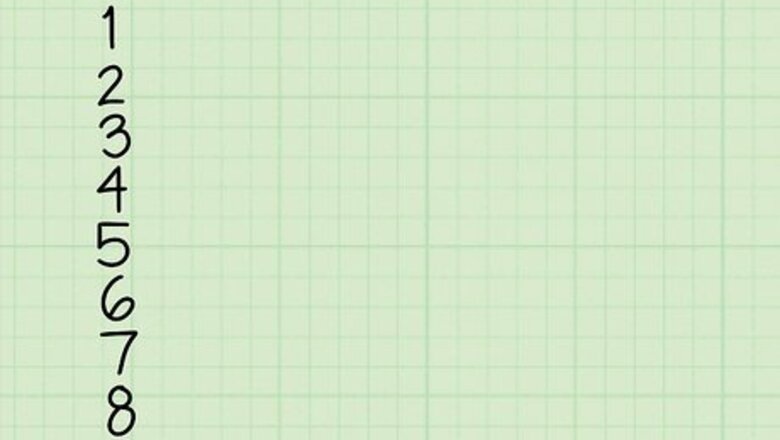
views
Using the Countdown Method
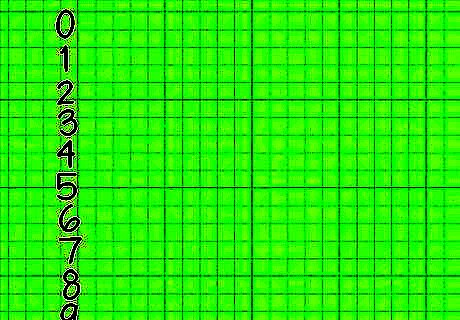
Write the numbers 0 through 9 down in a line in order. Make them in a vertical line with room to write to the right of them. You can do this on a sheet of paper or a blank document on your computer, whatever you like.
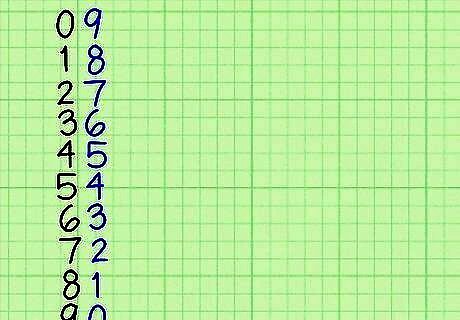
Write the numbers 9 to 0 next to the first set. In the first spot you will put a 9 next to the 0 you started with. Then you will put a 8 next to the 1 you put in the first row. Continue down until all of your original numbers have another number next to them.
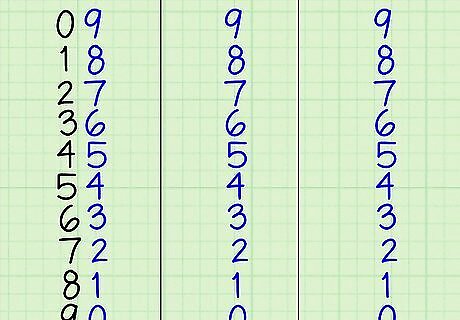
Continue writing numbers in the second column. Each time you reach a 0 in the second column, start over counting down from "9" to "0" in the ones place. Continue writing out these numbers until you have as many rows as you want to figure out. For example, if you want to figure out your multiplication chart up to 9 times 20, you will need to write out 20 numbers in the second column.
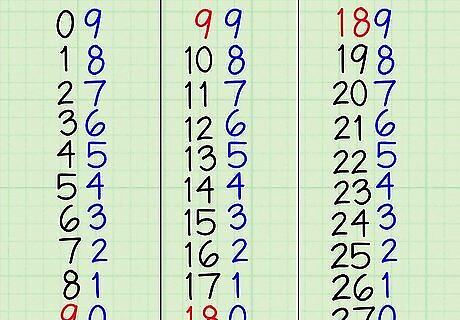
Repeat the same number in the first column as the number that is before it when the right column has a 0. Once you have repeated that number, continue on writing more numbers in ascending order. For example, when you get down to "90", put a "9" in the first column below it and you should have a "9" in the second column next to it. The vertical list should read: 09, 18, 27, 36, 45, 54, 63, 72, 81, 90, 99, 108, 117, 126, 135...
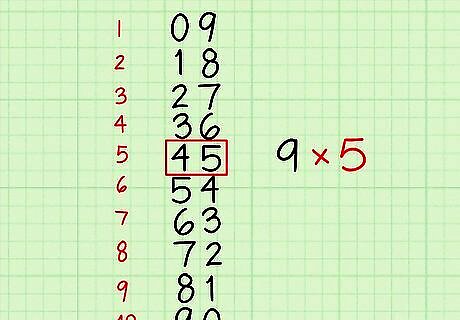
Count down the rows to figure out the times table. Each row represents 9 being multiplied by one number higher. For example, when you count down 5 rows you get to the number 45. This means that 9 times 5 equals 45. You could continue these rows down and you will continue to get the correct answer.
Replacing 9 with 10 and Then Subtracting the Multiplier
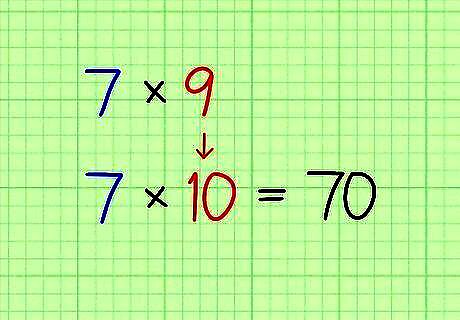
Replace 9 with 10 and do the multiplication. When trying to figure out one specific problem on the 9s times table, start by multiplying by 10 instead. For instance, if you are trying to figure out what 9 times 7 equals, multiply 10 times 7 first. In this example you will quickly be able to determine that 7 times 10 equals 70.
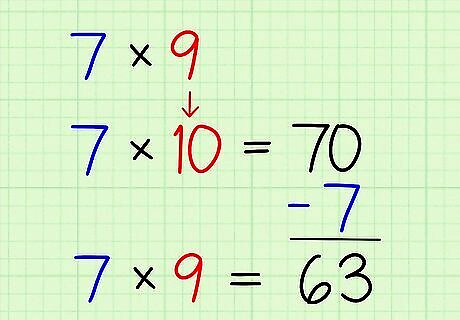
Subtract the number you multiplied 10 by from the answer you got. For example, if you multiplied 10 by 7, then you need to subtract 7 from the answer, called the product, of 7 times 10. If the product of 7 times 10 is 70, subtract 7 from 70 and you will get 63. Other examples include: 9x1 turns into 10x1-1 = 9, 9x8 turns into 10x8-8 = 72, 9x27 = 10x27-27 = 243.
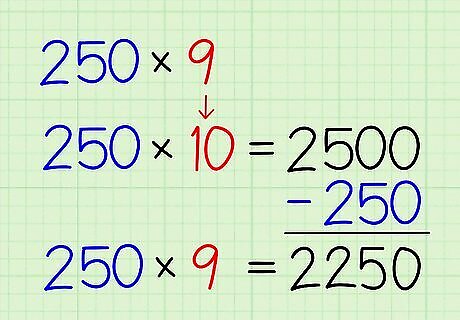
Try this with any large number you want to multiply by 9. You can use this trick to find the answer for very large multiplication problems involving 9. For instance, if you want to figure out how much 250 times 9 is, simply multiply 250 times 10 (2500) and then subtract 250 from the answer (2250).
Using Your Fingers
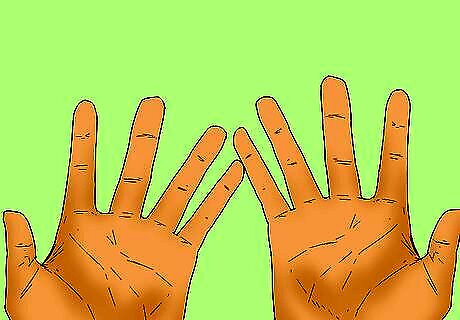
Put up all ten of your fingers. Hold up both of your hands in front of you. Have all of your fingers pointing up. It does not matter if your hands are facing in or out. This method works well for figuring out the 9s multiplication table for 1 through 9.
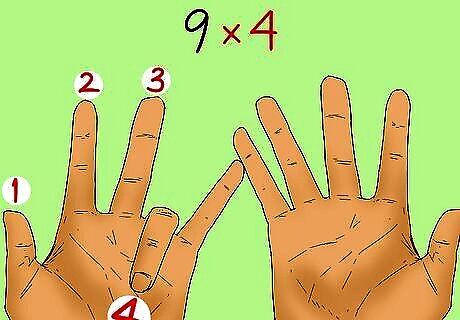
Count your fingers from left to right, ending on your multiplier. The multiplier is the number you want to multiply by 9. For instance, if you want to multiply 4 by 9, stop on the fourth finger. Then bend this finger down.
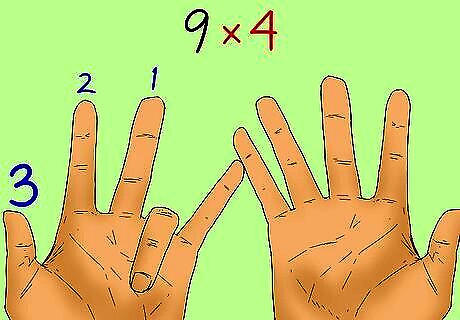
Count the number of fingers to the left of the finger you put down. In the example of 4 times 9, you will have 3 fingers to the left of the finger that is down. The number 3 will be in the tens place of your answer.
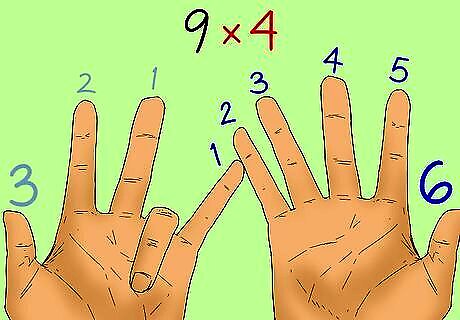
Count up the number of fingers to the right of the finger you put down. In the example of 9 times 4, you will have 6 fingers still up to the right of the finger you put down. This means that the number 6 will be in the ones place of your answer.
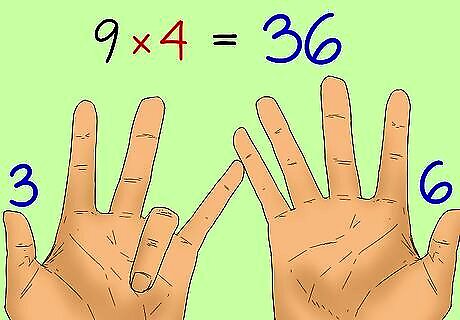
Put your answer together. By counting your fingers for the problem of 9 times 4 you have come up with a three in the tens place and a 6 in the ones place. This gives you an answer of 36. Try this trick for any of the 9s multiplication problems between 1 and 10.
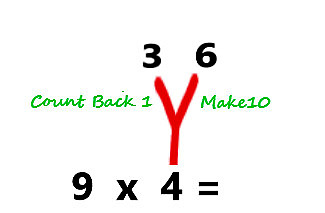
Rethink of this shortcut as ‘counting back and making 10.’ You don’t have to use your fingers, once you know the pattern to this trick. Start by focusing only on the multiplier. Reduce the multiplier by 1 for the first digit of the answer (the 10s digit). Then find the number that forms 10 with the multiplier, to give you the second digit of the answer (the 1s digit).9 multiples Eg Graphic JPG format.png For example, for 9 x 4, focus only on 4. Reduce it by 1 for the the tens digit: 3. For the units digit, consider that 4 plus 6 makes 10, so the digit to use would be 6. Your answer is 36. EXPERT TIP Joseph Meyer Joseph Meyer Math Teacher Joseph Meyer is a High School Math Teacher based in Pittsburgh, Pennsylvania. He is an educator at City Charter High School, where he has been teaching for over 7 years. Joseph is also the founder of Sandbox Math, an online learning community dedicated to helping students succeed in Algebra. His site is set apart by its focus on fostering genuine comprehension through step-by-step understanding (instead of just getting the correct final answer), enabling learners to identify and overcome misunderstandings and confidently take on any test they face. He received his MA in Physics from Case Western Reserve University and his BA in Physics from Baldwin Wallace University. Joseph Meyer Joseph Meyer Math Teacher Explore multiplication learning tool options. Multiplication grids, pegboards, electronic boards, and tiles offer a hands-on, engaging way to practice multiplication. Unlike flashcards that show a single problem, these tools can display multiple problems at once, helping you identify patterns and fast-track memorization.

















Comments
0 comment